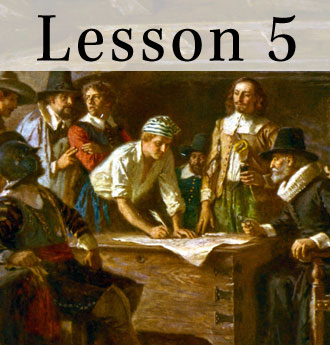Lesson 5: What Basic Ideas about Rights and Constitutional Government Did Colonial Americans Hold?
A Modell of Christian Charity ("City Upon a Hill" sermon)--John Winthrop, 1630
Believed to be written and delivered en route to Massachusetts, Rev. Winthrop warned his Puritan colonists that their new community would be a "city upon a hill," watched by the world.
Link: http://www.ushistory.org/us/3c.asp
A Declaration by the Representatives of the United Colonies of North-America, Now Met in Congress at Philadelphia, Setting Forth the Causes and Necessity of Their Taking Up Arms
From Wikipedia: The Declaration of the Causes and Necessity of Taking Up Arms was a document issued by the Second Continental Congress on July 6, 1775, to explain why the thirteen colonies had taken up arms in what had become the Revolutionary War.
Link: http://avalon.law.yale.edu/18th_century/arms.asp
Abolition of Star Chamber
The Star Chamber was a court that heard criminal and civil cases against prominent Englishmen, who, it was believed, would not receive a fair trial in the regular courts. In 1641, it was abolished by Parliament after controversial incidents with religious dissenters.
Link: http://www.lonang.com/exlibris/organic/1641-asc.htm
Articles of Association 1774
The First Continental Congress drafted the Articles of Association in 1774 to implement a trade boycott against Britain without severing allegiance to the crown.
Link: http://bit.ly/MJuu7
Bacon's Declaration 1676
The declaration of grievances issued to Governor William Berkeley by wealthy planter Nathaniel Bacon and his army.
Link: http://historymatters.gmu.edu/d/5800
Charter for the Province of Pennsylvania 1861
Official permission from King Charles II for settlers to "have, hold, possess, and enjoy" the land in Pennsylvania for the purpose of expanding the British Empire.
Link: http://avalon.law.yale.edu/17th_century/pa01.asp
Charter of Georgia, 1732
Document by King George II establishing a colony for the "poor people" of Britain to relocate to Georgia.
Link: http://avalon.law.yale.edu/18th_century/ga01.asp
Declaration of Independence 1776
From Wikipedia: The United States Declaration of Independence is a statement adopted by the Continental Congress on July 4, 1776, which announced that the thirteen American Colonies then at war with Great Britain were now independent states, and thus no longer a part of the British Empire.
Link: http://www.ushistory.org/declaration/document/index.htm
Declaration of Rights and Grievances of the First Congress of the American Colonies, 1765
The Declaration of Rights from the Stamp Act Congress declared that, as loyal British subjects, taxes imposed upon colonies without formal consent were unconstitutional.
Link: http://www.constitution.org/bcp/dor_sac.htm
Governor Berkeley's Response to Bacon's Declaration 1676
Governor Berkeley's response to the allegations against him enumerated in Bacon's Declaration.
Link: http://bit.ly/30SMWO
Indenture Contract of Richard Lowther, 1627
An indenture contract promising labor in exchange for transportation, food and drink and 50 acres of land.
Link: https://goo.gl/AGXErw
Indenture Contract of William Buckland 1755
The agreement between William Buckland and Thomas Mason granting Buckland would work for Mason in Virginia in exchange for transportation, food and drink, washing and lodging, as well as a salary of 20 pounds per year.
Link: http://www.virtualjamestown.org/wbind1.html
Maryland Toleration Act, 1649
The Maryland Toleration Act, passed by the assembly of the Maryland colony, mandated tolerance for Christians who did not practice Anglican Christianity.
Link: https://bit.ly/2PHzlHq
Mayflower Compact, November 11, 1620
The Mayflower Compact was the first governing document of the Plymouth Colony.
Link: http://mayflowerhistory.com/mayflower-compact/
Petition for a Charter of New England, March 3, 1619
A petition by the Northern Company of Adventurers to create a new settlement and local government in the area they designate as New England.
Link: http://avalon.law.yale.edu/17th_century/charter_002.asp
The Charter for Rhode Island and Providence Plantations July 15, 1663
Notice from King Charles II, establishing the English Colony of Rhode Island and Providence Plantations, in New England.
Link: http://avalon.law.yale.edu/17th_century/ri04.asp
The Combination of the Inhabitants Upon the Piscataqua River for Government, 1641
A letter to King Charles I, seeking permission to create a local government along the Piscataqua River.
Link: http://avalon.law.yale.edu/17th_century/nh07.asp
The First Charter of Virginia, 1606
From Wikipedia: Document in which King James I of England grants land rights to the Virginia Company for the stated purpose of spreading Christianity in the New World.
Link: http://avalon.law.yale.edu/17th_century/va01.asp
The Fundamental Constitutions for the Province of East New Jersey in America, 1683
An early constitution, creating a governing council and providing a limited enumeration of rights.
Link: http://avalon.law.yale.edu/17th_century/nj10.asp
The Fundamental Constitutions of Carolina 1669
From Wikipedia: Constitution adopted in 1669 for the area between Virginia and Georgia, written largely by John Locke. This document was very unpopular and mostly abandoned by 1700.
Link: http://avalon.law.yale.edu/17th_century/nc05.asp
The Fundamental Orders of Connecticut, 1639
The Fundamental Orders describe the government to be established by the Connecticut Colony as a self-governed entity.
Link: http://www.constitution.org/bcp/fo_1639.htm






